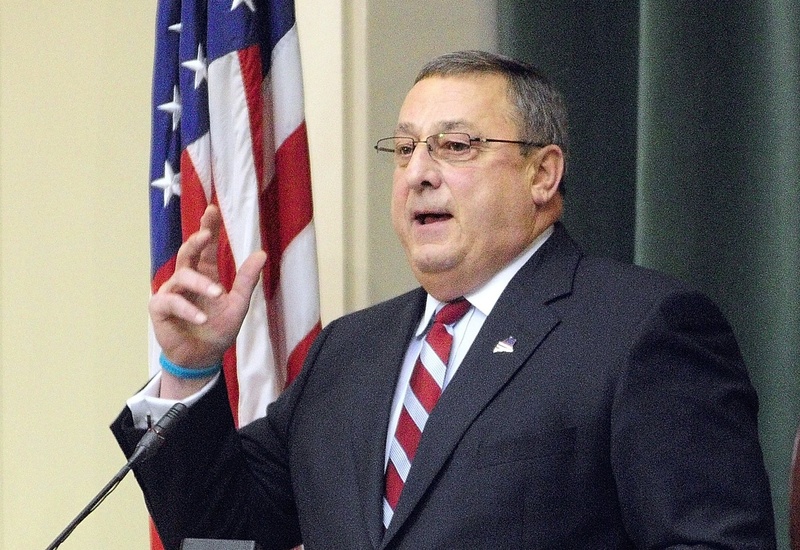AUGUSTA – With control of the Legislature at stake, Gov. Paul LePage is making selective appearances on behalf of Republican candidates, turning down more invitations for appearances than he’s accepting.
“He has a state to run,” said David Sorensen, state Republican Party spokesman. Still, Sorensen added, “he’s been out there.”
The latest event, billed as a Pre-Election Liberty Rally on Friday in Franklin, sought donations in a meet-and-greet with Down East candidates and the governor. LePage has appeared at other fundraisers and marched in parades with candidates as the Republicans try to maintain their first House-Senate majority in four decades.
Notable was an August fundraiser for candidates in Bangor in which LePage, who’s known for his off-the cuff, blunt statements, mentioned prospects of a special legislative session that has not materialized.
Democrats say LePage’s disapproval ratings make him a liability for some candidates, so he’s keeping a low profile in legislative races.
In a Pan Atlantic SMS poll released Wednesday, 37 percent of the 400 likely voters responding strongly disapproved of LePage’s job performance, and 15 percent disapproved somewhat, for a total disapproval rating on 52 percent. The same poll showed 44 percent somewhat approved or strongly approved of his performance. The phone poll was conducted Sept. 24-28 and had a margin of error of plus or minus 5 percentage points.
“They aren’t using him as a sort of rallying cry to build support around him,” said Lizzy Reinholt, spokeswoman for the Maine Democratic Party. “Traditionally, you have your figureheads out” campaigning for local candidates, she added.
Brent Littlefield, LePage’s senior political adviser, said LePage “is not like governors of the past,” who tended to immerse themselves in political events.
“Paul is not a typical politician,” Littlefield said. “Paul is focused on the policies of the state.”
Democrats are seeking to link legislative candidates with tax and other policies supported by LePage in an effort to weaken their support. Assistant Senate Democratic Leader Justin Alfond of Portland said that Republicans are “absolutely” running from their record during the past session.
“Many Republicans, I’m told, don’t even bring up Paul LePage, but they’re not even bringing up any of their major accomplishments that they tout when they’re in Augusta not talking to voters,” Alfond said on NBC’s local “In the Arena” program in Portland.
House Speaker Robert Nutting, R-Oakland, disagrees. Asked whether the legislative races across Maine are a referendum on the LePage administration, Nutting said, “No, I don’t believe so. I believe Maine, as in most smaller, rural states, local legislative races are an issue about the two candidates, or three candidates in some cases. Politics is local, and in Maine it truly is.”
Reinholt noted that politics hasn’t been strictly local for LePage, who attended a fundraiser in Delaware on Wednesday for that state’s Republican candidate for governor, Jeff Cragg, who is far outspent in his campaign to unseat Democratic Gov. Jack Markell.
Littlefield said LePage has also traveled to New Hampshire, Vermont and other states to help GOP candidates, but has turned down far more invitations than he has accepted.
“It’s just not possible to do all this kind of stuff,” Littlefield said.
In Maine, some candidates say, LePage gives them a boost. Sen. Doug Thomas, of Ripley, a Republican who’s in a tough fight against veteran state Rep. Herbert Clark of Millinocket to keep his Senate seat, said LePage came to Dover-Foxcroft in August and marched in a parade with local politicians, then attended other public events.
“I think he’s a lot more popular than people think,” Thomas said. “He can come to this district any time he wants.”
LePage’s predecessor, Democrat John Baldacci, did his share of fundraisers and other events for legislative candidates, former aides say. Now out of office, Baldacci is involved in the campaign to legalize same-sex marriage, with a pair of spaghetti suppers scheduled in Bangor and Portland to raise awareness of the issue. He has also contributed a newspaper column on the issue.
Republicans captured control of both the House and Senate for the first time since the mid-1960s and are trying to hold onto their majorities.
The GOP has 77 House seats to the Democrats’ 70, and there are two unenrolled members and two vacancies. The Senate has 19 Republicans, 15 Democrats and one unenrolled member.
Send questions/comments to the editors.



Comments are no longer available on this story